Enhance your maid etiquette training with these top 10 tips. Set clear expectations and communicate effectively. Maintain a professional appearance and behavior. Understand household dynamics for better interactions. Pay attention to details and act professionally. Handle feedback positively and manage time wisely. Keep confidentiality and handle challenges calmly. By following these tips, you'll improve your etiquette skills and succeed in your role.
Setting Clear Expectations
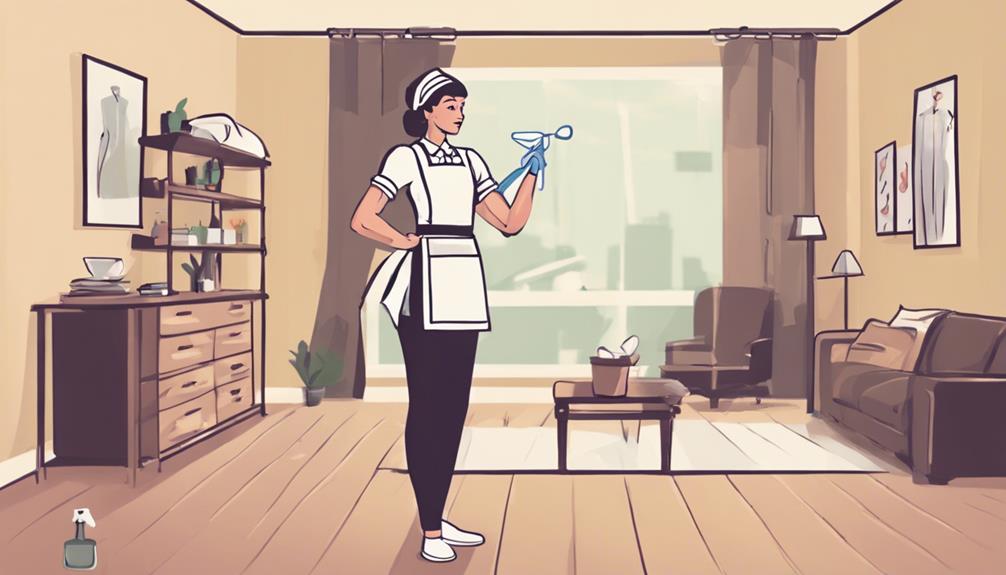
Setting clear expectations with your maid is essential for a successful working relationship. By clearly outlining what's expected in terms of performance evaluation, you provide a roadmap for success and create a foundation for accountability. Regular performance evaluations can help track progress, identify areas for improvement, and recognize achievements. This open communication ensures that both you and your maid are on the same page, leading to a more efficient and harmonious work environment.
In addition to performance evaluation, incorporating team building activities can further strengthen your relationship with your maid. Team building activities foster camaraderie, trust, and collaboration, which are essential for a productive partnership. Whether it's participating in group challenges, attending workshops together, or simply sharing a meal, these activities can help build a sense of unity and mutual respect.
Communication Skills Training
Effective communication skills training is crucial for enhancing the interaction between you and your maid, fostering a more collaborative and productive working relationship. Active listening plays a vital role in this training. Encourage your maid to listen attentively to your instructions and feedback, ensuring that there's a clear understanding of expectations.
By actively engaging in conversations and demonstrating genuine interest in what your maid has to say, you create a positive environment that promotes open communication.
Conflict resolution is another key aspect of communication skills training. Teach your maid how to address conflicts respectfully and constructively. Encourage her to express concerns calmly and to actively listen to your perspective.
By establishing a framework for resolving conflicts peacefully, you can prevent misunderstandings from escalating and maintain a harmonious work environment.
Incorporating these communication skills into your training program won't only improve the quality of your interactions but also strengthen the bond between you and your maid.
Proper Uniform and Grooming
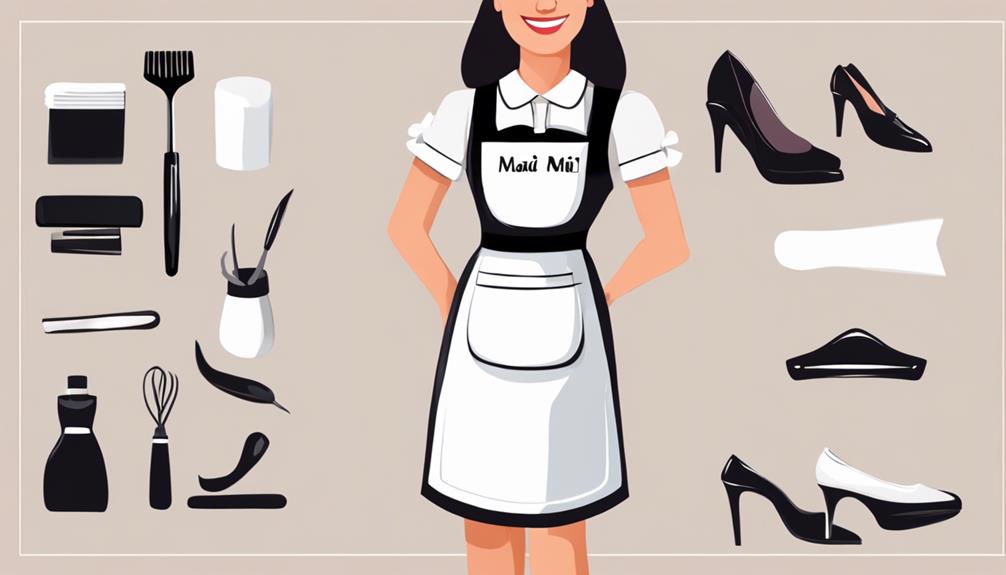
To ensure a polished and professional image, guiding your maid on proper uniform and grooming standards is fundamental for maintaining a professional appearance in the workplace. Uniform standards play a crucial role in creating a cohesive and professional look. Ensure that your maid's uniform is clean, well-fitted, and in good condition. It should also be appropriate for the tasks they'll be performing. Encourage the use of name tags to enhance a sense of accountability and professionalism.
Grooming guidelines are equally important. Emphasize the importance of personal hygiene, including clean hair, trimmed nails, and minimal makeup. Clothing should be neat and wrinkle-free. Hair should be styled in a tidy manner, and any visible tattoos or piercings should align with your household's policies. Encourage your maid to maintain a friendly and approachable demeanor while adhering to these grooming standards.
Understanding Household Protocols
Ensure your maid familiarizes themselves with the household protocols to effectively carry out their duties and maintain a harmonious environment within your home.
Understanding family dynamics is crucial as it allows your maid to navigate interactions appropriately. Each family has its unique way of communicating and functioning, and being aware of these dynamics will help your maid integrate seamlessly into your household.
Cultural differences also play a significant role in household protocols. Your maid should be sensitive to cultural nuances that may impact daily routines, communication styles, and traditions within your home. Encourage open dialogue to address any misunderstandings that may arise due to cultural diversity.
By acknowledging and respecting these differences, your maid can create a welcoming and inclusive atmosphere for everyone in your household.
Emphasizing the importance of family dynamics and cultural differences in your household protocols will help your maid excel in their role and contribute positively to the overall harmony of your home.
Attention to Detail
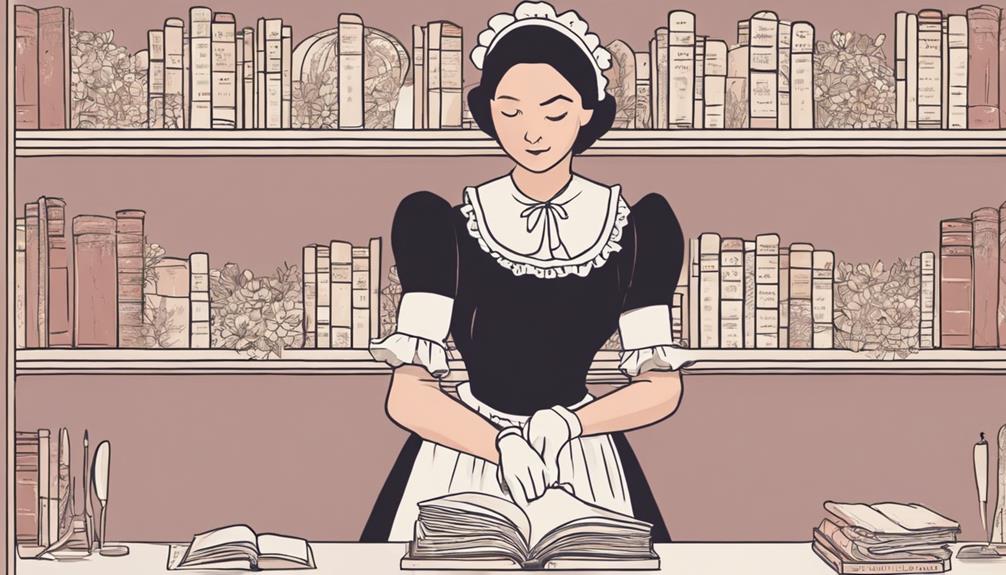
Develop a keen eye for detail to ensure thoroughness and precision in your maid's work. Pay attention to cleaning techniques such as using the right products for different surfaces, knowing how to properly dust delicate items, and understanding the importance of proper sanitation methods. Encourage your maid to adopt professional behavior by dressing appropriately, being punctual, and maintaining a positive attitude towards their duties.
To excel in attention to detail, train your maid to notice even the smallest imperfections in cleanliness. Emphasize the importance of consistency in their cleaning techniques to ensure all areas are addressed with the same level of care. Encourage them to double-check their work to catch any missed spots or areas that require extra attention.
Incorporating professional behavior into their daily routine won't only enhance their work ethic but also contribute to a positive working environment. Remind your maid to always maintain a respectful demeanor towards household members and guests.
Respectful Language and Tone
Maintain a respectful language and tone when communicating with household members and guests to uphold professionalism and create a welcoming atmosphere. Positive reinforcement is key when acknowledging good work or behavior. Praise your colleagues for their hard work, attention to detail, and dedication. This not only boosts morale but also encourages them to continue performing well.
When addressing areas for improvement, remember the importance of constructive criticism. Instead of focusing on mistakes, offer guidance on how tasks can be done better. For instance, if a room wasn't cleaned thoroughly, you could politely suggest checking hidden corners or using a different cleaning technique. This approach helps your team members learn and grow without feeling discouraged.
Keep in mind that the way you communicate sets the tone for interactions within the household. Use a friendly and professional tone when speaking to others, whether it's your fellow staff members or the homeowners. By maintaining respectful language and a positive demeanor, you contribute to a harmonious and pleasant environment for everyone in the household.
Handling Feedback Gracefully
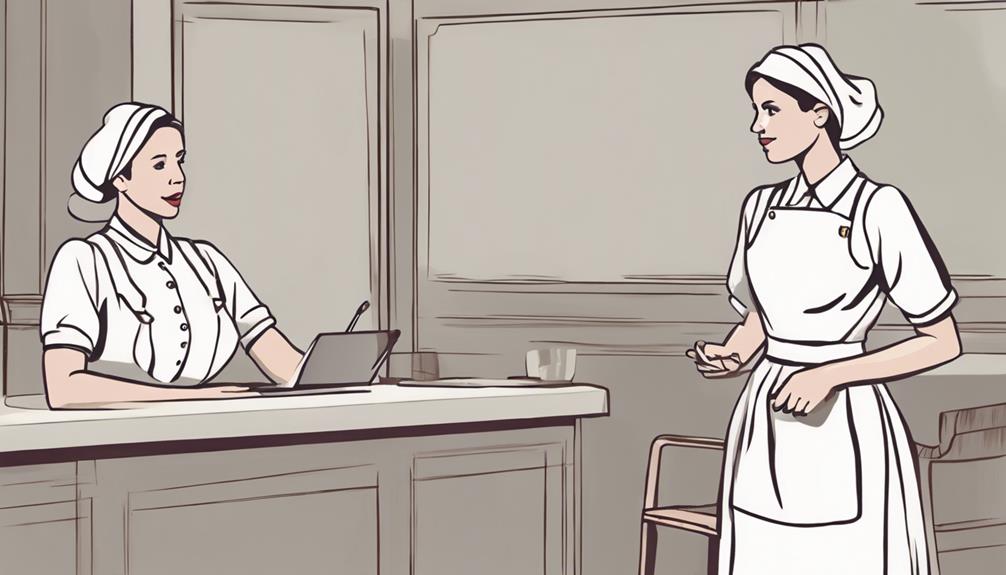
When receiving feedback, approach it with an open mind and a willingness to learn and grow. Receiving criticism gracefully is an essential skill for your professional growth as a maid. Feedback, whether positive or negative, provides valuable insights into your performance and areas for improvement. Remember that feedback isn't a personal attack but rather an opportunity to enhance your skills and service.
To handle feedback gracefully, start by actively listening to what's being communicated to you. Avoid becoming defensive or dismissive; instead, thank the person providing feedback for their input. Seek clarification if needed to ensure you understand the feedback accurately. Reflect on the feedback received and consider how you can incorporate it into your work to enhance your performance.
Embrace feedback as a tool for development rather than a point of contention. By approaching feedback with an open and positive mindset, you demonstrate your commitment to continuous improvement and professional excellence.
Time Management Techniques
Effective time management is crucial for maximizing productivity and efficiency in your role as a maid. Prioritizing tasks is essential to ensure that you accomplish the most important duties first. Start your day by creating a list of tasks ranked by importance, tackling high-priority items before moving on to less crucial ones.
This approach helps you focus on what truly matters and prevents you from feeling overwhelmed by a long list of things to do.
To further enhance your time management skills, make a conscious effort to avoid distractions. Whether it's your phone buzzing with notifications or engaging in idle chit-chat, distractions can significantly hinder your productivity. Set specific times for breaks to check your phone or socialize, and during work hours, stay focused on completing your tasks efficiently.
Confidentiality and Discretion
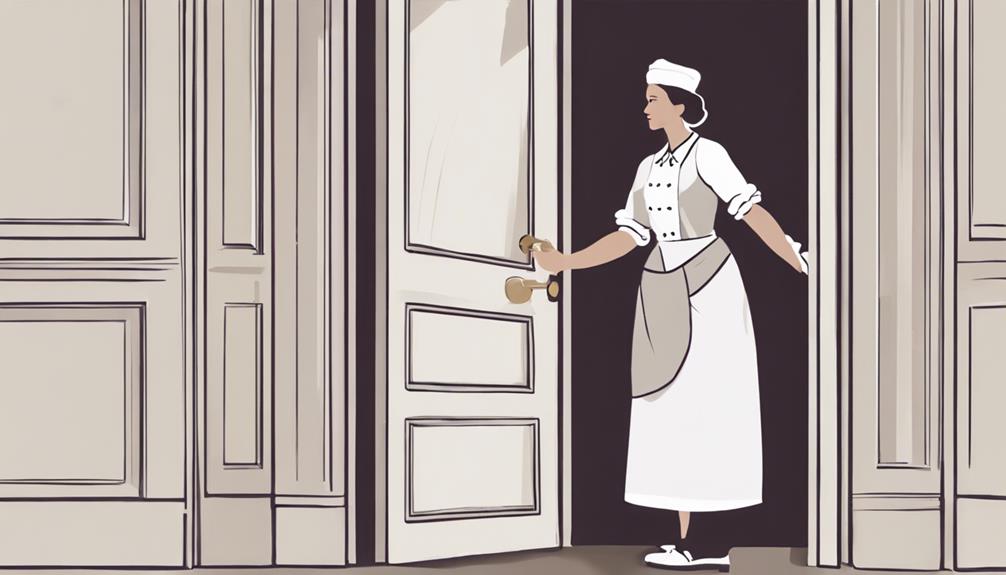
Upholding client confidentiality is a fundamental aspect of your role as a maid. Privacy protection is crucial in maintaining trust with your clients. As part of your maid etiquette training, you'll receive guidelines on discretion and confidentiality. It's essential to exhibit professional behavior at all times, especially when it comes to handling sensitive information about your clients and their homes.
Confidentiality training will equip you with the necessary tools to safeguard any personal details you may come across while performing your duties. Always remember to keep all information confidential, whether it pertains to the household itself or the individuals living there.
Adhering to strict confidentiality guidelines demonstrates your commitment to professionalism and respect for your clients' privacy. Maintaining discretion in all matters is key to building a strong reputation as a reliable and trustworthy maid. By following the established confidentiality protocols, you not only protect your clients' privacy but also uphold the integrity of your maid services.
Dealing With Challenging Situations
In navigating challenging situations as a maid, it's essential to approach each issue with a calm and solution-oriented mindset. Conflict resolution skills are crucial when dealing with difficult clients. When faced with a challenging situation, remember to stay composed and focused on finding a resolution that satisfies both parties.
When conflicts arise, listen actively to your clients' concerns, showing empathy and understanding. Acknowledge their perspective before calmly expressing your own. By demonstrating patience and professionalism, you can often diffuse tense situations and work towards a positive outcome.
It's important to address issues promptly and directly but always maintain a respectful tone. Avoid becoming defensive or argumentative, as this can escalate the conflict further. Instead, strive to find common ground and collaborate on finding a mutually beneficial solution.
Remember that dealing with difficult clients is a part of the job, and your ability to navigate these situations with grace and tact will set you apart as a skilled and professional maid.
Conclusion
In conclusion, by following these top 10 tips for maid etiquette training, you can ensure that your maid staff is well-equipped to provide top-notch service to your clients. Setting clear expectations, improving communication skills, and maintaining professionalism will help create a positive and efficient work environment.
Remember, attention to detail, handling feedback graciously, and dealing with challenging situations with grace are key components to successful maid etiquette training. Keep these tips in mind to elevate the level of service your maid staff provides.
